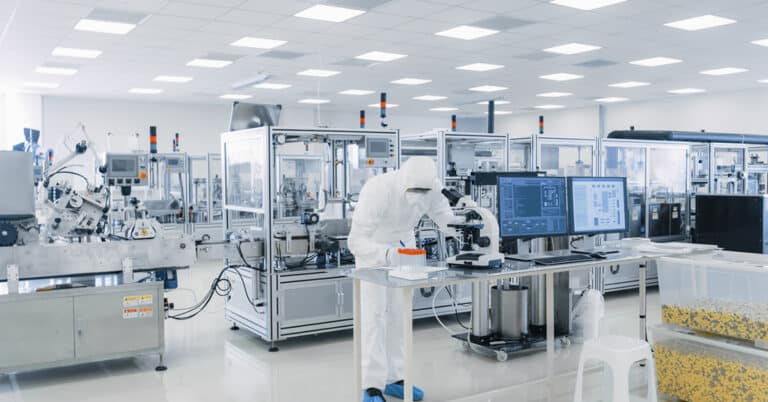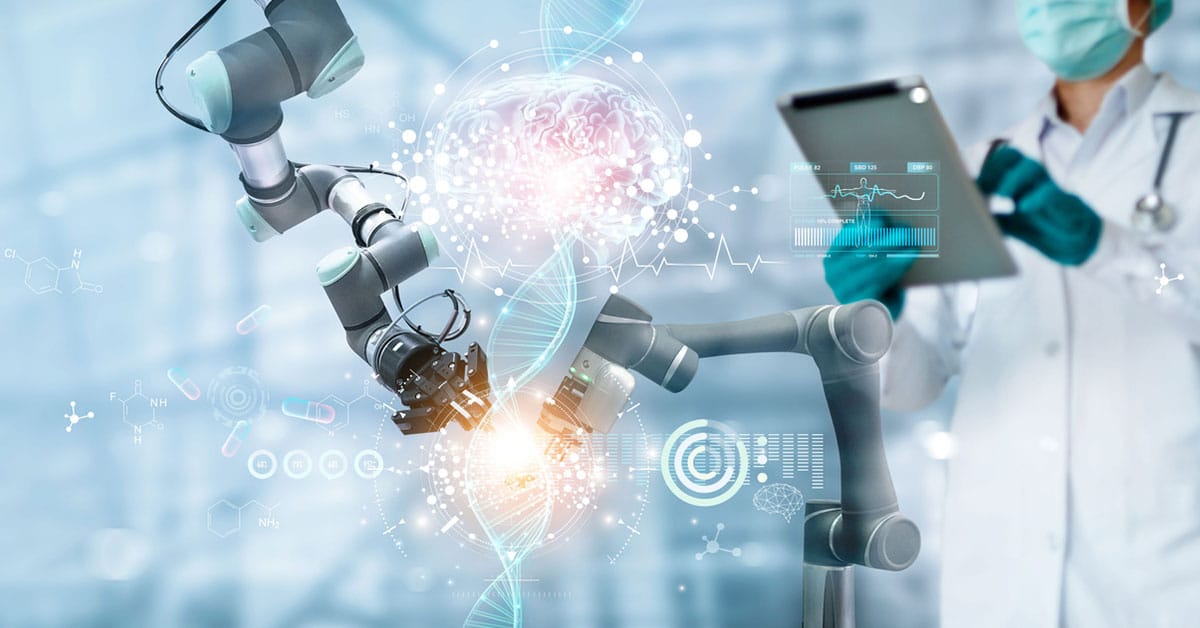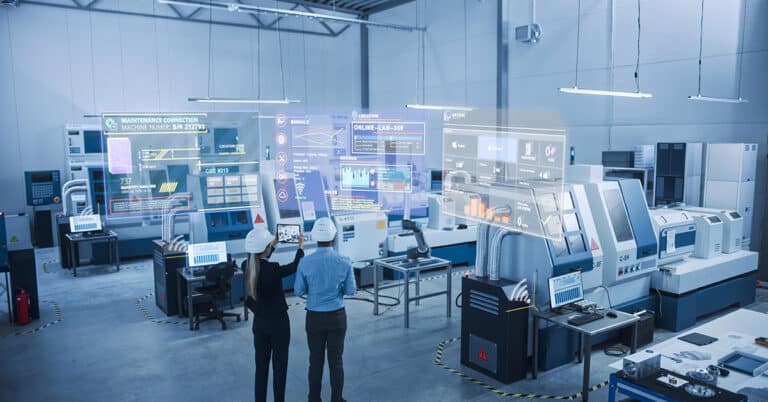Pharmaceutical manufacturing is one of the most challenging, high-precision processes across industry — and one of the most important and impactful. Developing and producing reliable medicine to help people stay healthy is one of the major accomplishments of the modern era, leveraging innovation, expertise and technology to tangibly improve public health and quality of life.
Because pharmaceutical manufacturing must be carried out to exacting standards in order to maintain the quality and safety of the end product, the process can also be difficult and inefficient. AI in pharmaceutical manufacturing, as in many other industries, is making significant inroads in improving efficiency, quality and other areas of the process, helping to deliver more effective products to more people, more quickly. In this blog, we will examine the current and future impact of AI in pharma manufacturing.
The pharmaceutical manufacturing process

Before our in-depth look at AI in pharmaceutical manufacturing, it is important to understand the pharma manufacturing process itself. Pharmaceutical manufacturing must be conducted under numerous strict regulations, certifications and guidelines, and every pharma or medical manufacturing process, whether medicine or medical products, must be carefully controlled.
The pharma product development and production cycle typically follows these steps:
- Product identification
- Product development
- Clinical trials
- Patenting
- Product formulation
- Manufacturing/production
- Quality control
- Packaging and fulfillment
The production and packaging processes merit a closer look as well, since many of the processes within these steps are critical and highly regulated. These steps include:
- Powder feeding
- Combining the Active Pharmaceutical Ingredient or Ingredients (API) with excipients
- Milling
- Hot melt extrusion
- Formulation of the delivery method — capsule, tablet or other method — by compressing the powder into the necessary format
- Packaging and labeling in accordance with regulations
How can AI impact pharma & medical manufacturing?

AI can impact pharma and medical manufacturing in a number of ways. Primary among these include:
- Predictive maintenance: Predictive maintenance makes use of industrial sensors, condition monitoring, analytics and communication to detect the beginnings of more significant maintenance issues well before they impact production, allowing managers and technicians to take more proactive action. Predictive maintenance improves productivity, reduces downtime and lowers maintenance costs. AI in this area can be used to identify potential problem states, to detect the occurrence of those states, to aid in troubleshooting and diagnosis, and to assist in maintenance training.
- Asset management: An effective asset management strategy helps pharmaceutical manufacturers extend the useful life of equipment and components, maximizing the return on investment. AI is being used in asset management in various ways, including detecting the optimal time to take equipment out of service and conduct maintenance; aiding in inventory management, supply chain and sourcing; helping technicians to troubleshoot potential issues; and detecting and avoiding potential shutdowns or safety issues before they occur.
- Utilization of advanced analytics: Today’s manufacturing facilities are more reliant than ever on data and analytics, and the pharma field is no exception. AI is proving to be exceptionally useful in producing advanced analytics from multivariate inputs, providing more effective insights than ever.
Examples of AI in medical manufacturing
Some real-world examples of AI in medical and pharma manufacturing include:
- Monitoring complex precision systems: Pharma and medical manufacturing require a vast network of interconnected systems to operate at peak precision, including compressors, boilers, pumps, water systems and point-of-production equipment. Predictive maintenance using AI and machine learning can help to maximize the lifecycle of systems and equipment while also improving key efficiency and productivity metrics such as mean time between failure (MTTF).
- Aiding in maintenance troubleshooting and diagnostics: When failure or problem states are detected in equipment performance, maintenance technicians must then begin the process of troubleshooting and diagnosing the issue in pursuit of the eventual fix. With predictive maintenance, this task can be even more challenging due to early detection. AI assistance can help to identify potential root causes and set technicians on the right track more quickly and efficiently.
- Spurring innovation: With the help of AI, data from clinical trials and other stages of the pharma product development cycle can be analyzed to potentially identify new, more effective drugs and other medical products. AI is able to quickly synthesize vast swaths of disparate information, opening up new doors in manufacturers’ mission to continue improving public health.
AR & VR in medical manufacturing
As a complement to AI, virtual reality and augmented reality in pharma manufacturing can also provide numerous benefits. Primary among these is training, helping new hires to quickly gain the necessary knowledge and experience for their tasks.
Augmented reality (AR) is especially useful in this area, with the ability to mimic actual production line conditions (or other tasks) for the employee to gain “hands-on” experience without the need to slow down or stop production. This practice enables employees to learn much more quickly, without risk to efficiency or quality. AR and VR are important components in the digital transformation of pharma manufacturing.
ATS offers experience in maintenance strategies and services to a broad range of industries, including medical manufacturing maintenance. We provide a comprehensive approach to maintenance and MRO, all focused on increasing your uptime and bottom line. To learn more about our condition monitoring and industrial technology solutions, contact us today.


